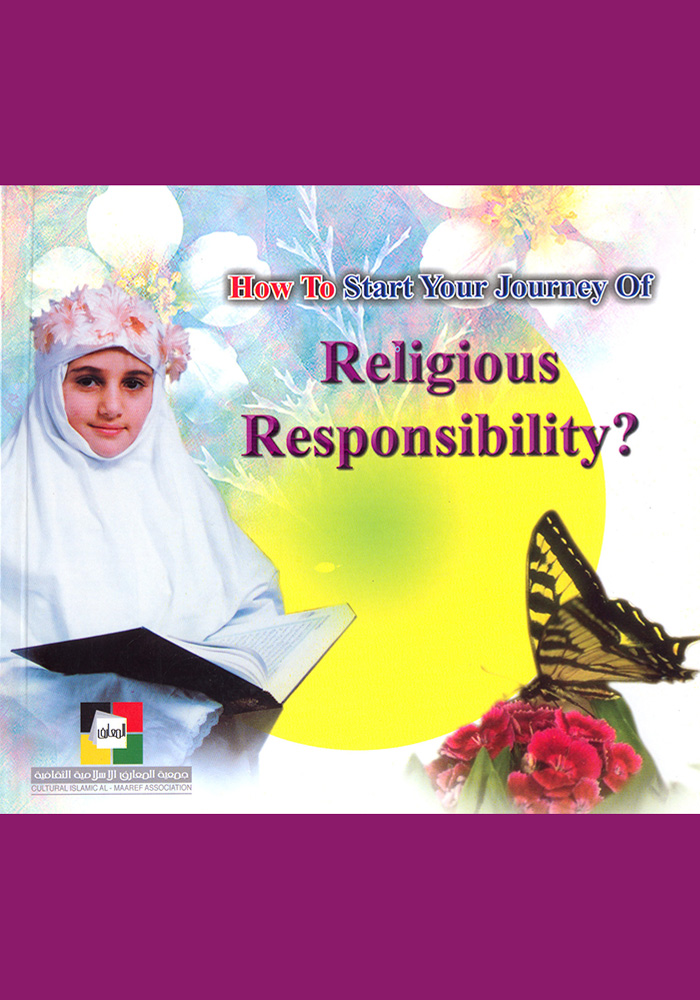
How To Start Your Journey of Religious Responsibility?
الناشر: جمعية المعارف الإسلامية الثقافية
تاريخ الإصدار: 2018-03
النسخة: 0
الكاتب
جمعية المعارف الاسلامية الثقافية

الناشر: جمعية المعارف الإسلامية الثقافية
تاريخ الإصدار: 2018-03
النسخة: 0
جمعية المعارف الاسلامية الثقافية
Greetings
3- God will resurrect [bring back to life] people after they die for the account. He will punish the wrong doer and reward the good doer during a day called "The Judgment Day". Then, He will send the pagan and the wrong doer to Hell while He will send the believer and the good doer to Heaven.
you are still in His presence, but there is an important difference between childhood and now. It is that you will start now one of the most beautiful experiences of your life which, we promise, is going to be the most important too.
The Universal Vision
You must not delay or ignore the answers to these great questions because they are related to the reason of your existence. When you get the answers and when you believe that these answers are true, they form what is known as "the creed" or "the universal vision".
As regards the existence, the divine universal vision in The Noble Qur'an explains for us the following:
2- The Most High and Glorified God sent the prophets (God's peace bestowed upon them) to carry out a great mission: guiding the people to the straight path. He chose them because they are purified from sins and bad deeds and because they have sublime souls.
The Religious Rules
- Duties: They are the deeds that you must perform and that you must not abandon, such as: daily prayers, veiling, honesty, etc.
The most important points that you are religiously responsible for are:
Imitation
Answer: You must imitate the jurisprudent who meets the conditions of giving advisory opinions and those of being a reference for people. He must, as a caution, be the most knowing one among the others.
There are many jurisprudents who meet the conditions of giving advisory opinions and of being references of imitation. Then, whom must we imitate?
The First Testimony:
The Second Testimony:
Guardianship and Disavowal
On head of God's authorities is Prophet Mohammad (God's prayers bestowed upon him and his Household) who is the best among human beings. The Most High God said about him, ﴾ The Prophet is more guardian of the believers than they are of themselves﴿. The Prophet's Purified Household succeeded him. God elevated them above shameful deeds and purified them from sins. The Most High God imposed on us to love them in His Saying, ﴾ Say I ask you no reward but the love of my family﴿.
The Concluding Prophet
Opposite to guardianship is disavowal. Disavowal means to feel in your heart hatred towards God's enemies and their deeds and to consider that you belong to the party that opposes their party. You achieve this by refusing to obey the devil and to follow his supporters.
Not Committing Sins
The most dangerous great sins that you and your peers may fall in are:
Performing Duties
How To Perform These Duties?
What Are the Main Duties?
I seek refuge by God from the cursed devil.
The imposed prayers are classified into two parts:
1- Verses Prayer: It is made up of two bows that are performed in a special way. It becomes imposed at the moon and sun eclipse, the earthquake, and the universal events that frighten people.
B- Ordering with What Is Good and Forbidding What Is Bad
You must apply this divine duty gradually. This means to use the soft and proper means at first. If these means do not have any influence, you then move to harder means, and so on.
C- Wearing the Islamic Veil
Wearing the Veil:
Veil's Identity Card
Did God really order the girl to wear the veil? Of course, He did, and He sent down noble verses in order to announce this duty to women.
The second verse is Verse 31 of Al-Nour [The Light] Chapter ﴾And tell the believing women to lower their gaze, protect their private parts, not to show off their adornment except only that which is apparent, to draw their veils all over their bodies, and not to reveal their adornment except to…﴿. This verse calls the female believers to:
Standards of Veiling
Kinds of Veil
Limits of the Veil
Grooming and Adorning
The kinds of adornments that you must not show to marriageable men are:
O you yearning to God's protection! You must know whom your unmarriageable kins are because you must wear the veil in front of the marriageable kins.
The unmarriageable kins are divided into two parts.
Second: The Unmarriageable Kins in Reason
The Jurisprudence of the Veil
3- You can take photos for yourself without wearing the veil among your unmarriageable kins, but the photographer must be a woman or one of your unmarriageable kins.
The Social Role of the Responsible Girl
The first reason is that the girl does not really believe in these duties and in this role. This is called weakness of faith. She acknowledges that God and the hereafter exist; that God sent the prophets with divine messages and books; that performing the duties announced in the messages leads her to Heaven; and that the human being has to play an effective role in the society. Although she acknowledges all of this, she is not ready to endure some difficulties on this path.
The second reason is that there are obstacles, which we call "conspiracy". This conspiracy is plotted against the girl, especially the Muslim one, in order to rob her of her human identity, to deviate her from the path of chastity, and to enter her into the mazes of loss and absurdity.
Conclusion